9 incredibly successful people and the first job that made them who they are
- Transfer
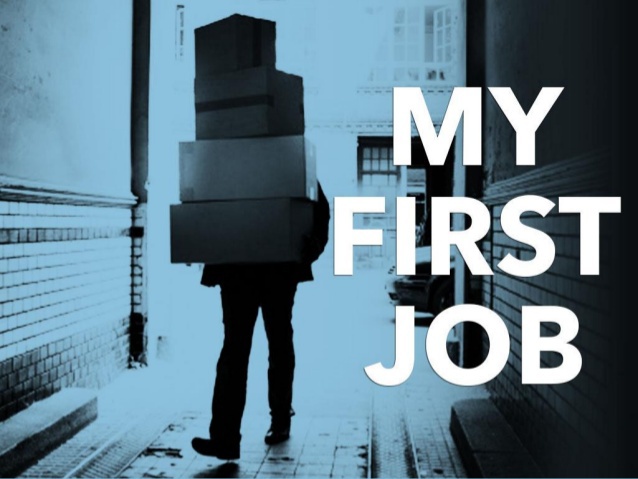
Do you remember the summer you worked as a lifeguard, or that semester in college when you were a coffee maker? Can you draw a parallel between the tanned child and the professional in their field that they have now become? That inner youth is still in you - it forms your every decision. In this article we will tell about nine successful people and their first places of work.
The difficulties that you once encountered hardened you, the actions you took influenced your worldview, and what used to illuminate your world inspires you now. Most successful people take advantage of their inner youth, devoting themselves to hard work with soul and creativity.
In collaboration with Citi (Citigroup Inc. - the largest international financial conglomerate, one of the world leaders in the field of financial services), we talked with nine influential entrepreneurs, politicians and legendary cultural figures about their first jobs, and how they helped them become who they are. Regardless of whether you became what you wanted to be, or just take your first steps on the career ladder , in this article you will find the main thing - inspiration.
1. Cindy Loper - American recording artist, co-founder of True Colors Fund
First job: clerk

While most girls just want to have fun, Cindy Loper always thought more that everyone had equal access to fundamental civil rights. In 2008, she became a co-founder of True Colors Fund, a charity fund whose goal was to highlight the problem of homelessness among gays, lesbians, bisexuals, and transgender people, and to encourage society to participate in ensuring the safety of this category of citizens and establishing equality for all.
As a teenager, according to Loper, she did not fit into generally accepted standards. Always dreamy, she could not boast of success in “normal” work, for example, in a large publishing house.
“I really tried very hard to meet accepted standards, but I didn’t succeed,” she says. “When I was a child, I did not feel any success. If you do not succeed, the desire to leave the house, meet the world face to face and win simply disappears. ”
Living in a world that made Loper feel unnecessary, she discovered that singing could literally transform her. This lesson inspired her to help others find their niche, regardless of education or orientation.
“When I see children who feel like no one and need to increase their self-esteem, I want to prove to them that they cannot let life break them - you can’t always stay on the sidelines,” she says.
When Cindy worked as a clerk, unhappy in this role, her office was on Christopher Street in New York. Now she plans to build a building for True Colors Foundation on this street.
“You will encounter many obstacles along the way,” she says. “Always look around the obstacle that has arisen, usually you can get around it.”
2. Curtis Granderson - Outfielder at the New York Mets
First job: handyman in a park and recreation area

Star team player Curtis Granderson throughout his career has been an absolutely indispensable member of several baseball teams, including his current New York Mets team. But once he worked part time, putting his area in order.
“I worked as a janitor in parks and recreation areas,” he says. This was a peculiar summer tradition for children in a suburb of Lynwood, Illinois. We often went straight from work to evening sports classes and to circles. “If there is something that I could learn from that experience, then this is time management: the ability to achieve the goal immediately, without delaying the business the next day.”
The future sports star found a worthy application for his enthusiasm and youthful carelessness, painting, along with his teammates, curbs and fire columns, cutting grass and cleaning garbage.
“If you are constantly busy doing something positive, you don’t have time to look for trouble,” says Granderson. “You are starting to set priorities, and understand that even if you are tired, you should continue to work, otherwise you will not receive your daily payment.”
As soon as Granderson began to take responsibility for his time and finances, his parents gave him more independence. Awareness and modesty gave the outfielder some advantage in baseball.
“If it gives you joy to do something, you will certainly achieve positive results in this matter, and the results are a pleasant addition to the delight of what you do,” says Granderson. “Regardless of whether I’m in the baseball training booth, practicing on the field, or participating directly in the game, I just do what I have to.”
3. Angela Glover Blackwell - Founder, Executive Director, PolicyLink
First job: counselor (summer vacation)
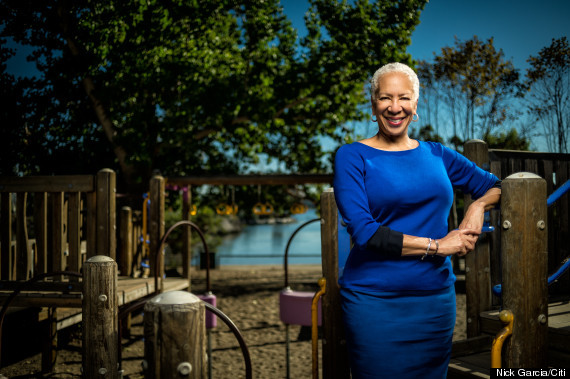
Blackwell got her famous hardening in one hot Missouri summer when she worked as the host of the summer program for girls. This was her first trip to the countryside since college and her first job. She later continued to work in this direction and founded PolicyLink, a leading research institute for promoting social equality.
“I don’t know how familiar you are with the climate of Missouri,” she says, “but in the summer it can be so hot here that it’s impossible to breathe.” Once, the temperature exceeded 105 degrees Fahrenheit (40.56 ° C (gr. Celsius)). Angela came to work, and found that there was no one on the asphalt site except her four colleagues - no children, no one left the house due to the unbearable heat.
“That day, my father drove up with an ice crate with ice cream and root beer and aluminum glasses, which were popular in the 60s,” she says. He made them all drinks.
“I thought: 'My dad has arrived. He's going to take me home, 'but soon he just packed up the cooler and left. I remember, a thought flashed through my mind: “Oh my God, I will have to stay here until the end.”
For Blackwell, “equality” means honesty, that is, an inclusive society in which everyone can realize their potential.
The actions of her father taught her the concept of justice in the context of fulfilling the tasks set, and also the fact that a good organization of the work process helps to quickly complete the intended, "even if it is difficult, even if it is very hot."
4. Lorena Feiju - prima ballerina, San Francisco Ballet Company

First work: participant in the social support program
Feige's rational passion for dancing is rooted in her youth when she was obliged not only to study art, but also to teach it to those who did not have access to theatrical activities.
“In Cuba [where she grew up], participation in social support programs was an essential part of studying at a ballet school,” she explains. “Even as children, we took part in support programs for people living in remote areas of Cuba, helped very poor people who do not have access to art, and taught their children that art plays an important role in human life.”
“By throwing a seed on the fertile soil of children's consciousness as early as possible, no matter in what form, whether it is involvement in the world of art, science, or craft, you give your child the ability to choose what he is most inclined to by nature”, Says Fage, whose mother was a ballerina. “I have friends who have made an excellent career in large companies around the world, precisely from the areas we went to, implementing the support program.”
5. Suni P. Harford - Executive Director, Regional Head of North American Markets at Citi
First job: Swimming coach
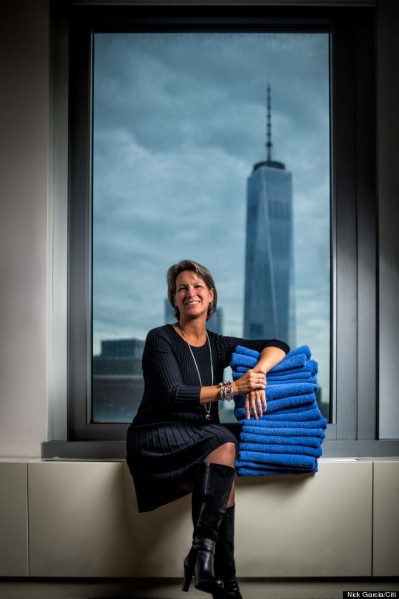
Suny Harford oversees all aspects of Citi's capital markets business in North America, including sales, trading and securities and banking. Having studied at the college such sciences as physics and mathematics, she showed herself in the field in which women occupy only a quarter of all jobs. But earlier, as a swimming coach, she encouraged children to develop their athletic strength.
“If you want children to develop talents in the field in which you teach them, and not to be [just] a nanny for them, and want them to win, then you have to hit several goals at once,” she says. “Your task is multifaceted, because you: must meet the needs of your employer, strive to ensure that children enjoy the learning process, and interact with their parents, whose goals for children can diverge from those goals that you set for the whole team.”
This work implies only a seemingly banal task - to always be confident and positive authority, not to allow personal ambitions to work, and to create a team that plays, relying on each other's skills, covering the weaknesses of an individual player, with the advantages of the whole team as a whole. However, the most important lesson Harford learned from her work is simply amazing.
“One of the unexpected advantages of working as a child’s trainer is that you understand that you cannot do without humor. Watching everyone take a really ridiculous thing seriously, like trying a seven-year-old to swim 25 yards in free style and win, is something, ”she says. “We are not doctors who save lives every day, and despite the fact that our work is also important, it is not worth the stress, which (as it sometimes seems to us) is its integral part.”
6. Nancy Pfandd - Managing Partner at DBL Investors
First job: Sierra Club Specialist
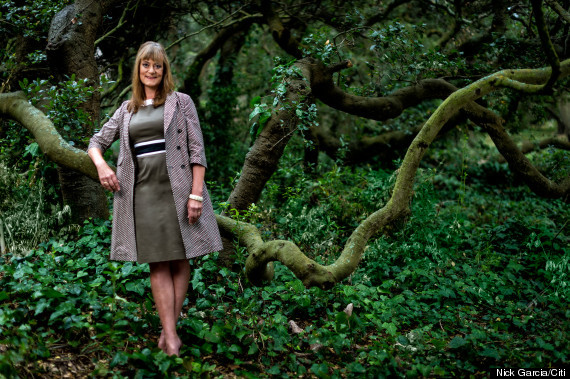
If you listen to Internet radio, use a solar panel or own an electric car, then thanks for this, you should Nancy Pfand. As the managing partner of the venture capital firm DBL Investors, Pfand not only invests in companies with revolutionary ideas, but also controls their positive impact on the part of society for which they work. Her policy of “socially responsible enterprises” originated during her internship at the Sierra Club, the country's largest environmental organization.
As a college student, Pfand was only interested in the nascent gene research that had given rise to a wave of tension among scientists and influential politicians who “saw everything in a different light”.
“Now these are technologies that are universally used for scientific research, but then genetic research was a very controversial area,” she recalls. “At some point, it became possible to overcome the contradictions between conservative people and politicians, find common ground and establish dialogue, to understand that solving the problem is important for everyone.”
She emphasizes that at that moment, participating in the debate, she did not depart from her principles, but was able to admit that she lives in a multifaceted society, with many points of view - a lesson for life.
“I realized that the way you imagine the problem is not really that important,” says Pfand. “The art of compromise is everything for decision-makers and the key to progress.”
7. Jacob Singer - President, CEO of Oakland Business Development Corporation
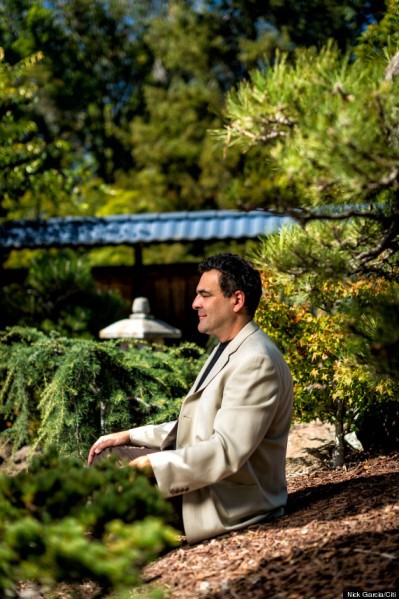
First job: equipment operator in the distribution business,
Jacob Singer, at the age of 17, was already driving trucks and forklifts while working in his family's business. Having worked mainly in Southern and Central Los Angeles, he understands the importance of providing loans and assistance to those entrepreneurs who do not have access to bank financing.
“Of course, it was much more interesting for me to study philosophy, psychology and go to college, but anyway, it was a valuable, exciting time in my life,” says Singeo. [My work] was located in one of the largest low-income counties in Los Angeles. I spent my youth working in a truly diverse environment. ”
He had a passionate desire to make small business a link connecting aspects such as job creation and survival in these areas, so after graduate school he left to try and find “humanity” in the often ruthless business world.
“I spent many years (from the end of the second to the middle of the third decade of my life) trying to understand the multifaceted nature of the human spirit and mind. This allowed me to return to my work with even greater thrill. ”
8. Maria Torres Springer - Head of New York City Small Business Services (services for small businesses in New York)
First job: lawyer consultant
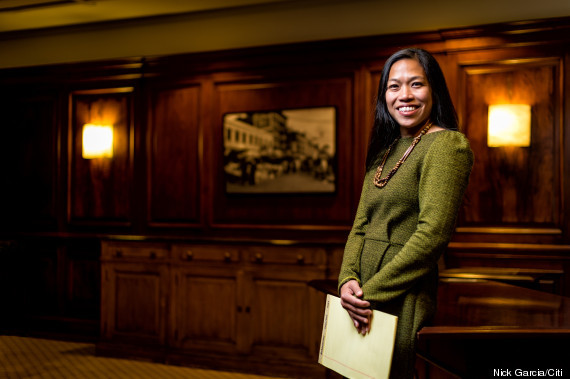
Like Singer, Maria Torres Springer, Head of Small Business Services New York, built her career from scratch. As a child of the first generation of immigrants, Torres Springer has always appreciated the opportunities that allowed her to understand the professional world.
During her practice in legal counseling, while still in college, Torres Springer regularly came across people who had really serious problems.
“One of the most interesting things I did was read dozens of letters from prisoners from all over the state who were trying to get clarifications on their case,” she says. “It was unbelievable to see the anxieties of the prisoners struggling to get clarification and to get justice.”
She says: “I wake up every morning, thinking about what it means to give those who need it to understand their problem. I’m trying not to leave the fate of New Yorkers at the mercy of providence and do my best to help entrepreneurs and job seekers have equal opportunities, regardless of what language they speak and from which social class they come from. ”
9. Lisa Baird - Marketing Director, US Olympic Committee
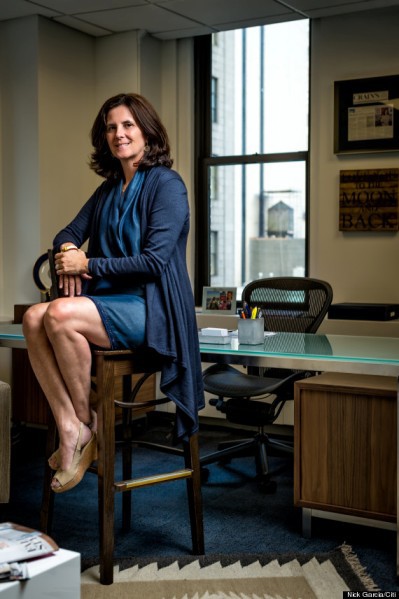
First job: Bartender
Lisa Baird helps Team USA (USA team) look decent. As the marketing director of the U.S. Olympic Committee, Baird rebranded him and honed his winning image. She owes her brilliant skills in working with people to years of work at the bar.
“I did not have work experience in this area, but I was sure that I could do it, so they gave me this job,” she says. “That was in 1980. Subsequently, I worked with industry representatives, took on various tasks, performed many functions. And all this thanks to that risky step. ”
Bartenders should ensure that everyone has fun, be careful about inappropriate people, make drinks and manage money, being in the spotlight, as if it were all easier than ever. These skills became the key to career growth for Baird.
“Modern children are very interested in managing a hedge fund or in becoming a manager at 22, but in my opinion, first of all, anyone should understand what responsibility is, self-control, and prove that he is able to work with people,” she advises. “No one should make a final decision on choosing a profession in a hurry.”
PS. We recommend another article on the topic - Why Dima Korolev left Microsoft, Facebook and Google before joining a startup
Translation by Vyacheslav Davidenko, founder of MBA Consult
